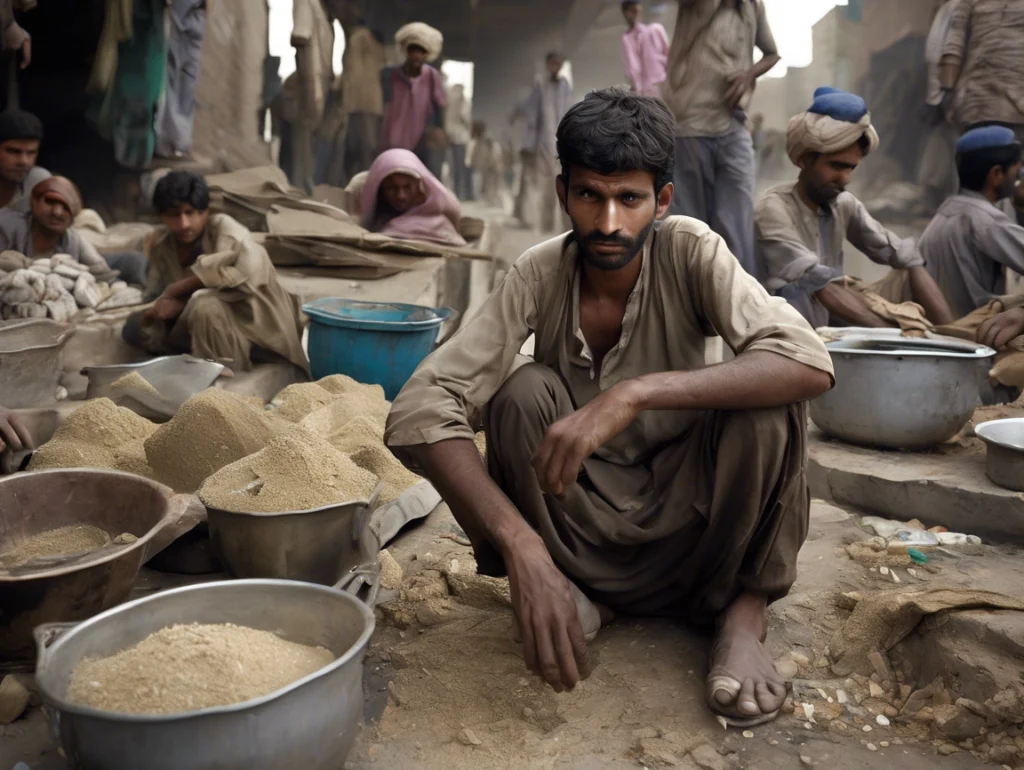by Hajra Ahmed
Labour rights in Pakistan are protected under the 1973 Constitution and various labour laws, safeguard fair wages, safe working conditions, and the right to unionize pertaining to any breach of laws and ill-treatment. However, challenges remain, especially for informal sector workers who often lack formal and legal protections. Informal Workers in factories, construction sites and households suffering from poor working conditions, inadequate wages, old age benefits and the lack of social security. Despite the laws, workers are majorly exploited in many ways.

One of the major issues is the inadequate wages the workers receive. Sometimes, they are paid way below the minimum wage set by the government, this usually leads to multiple difficulties for the workers such as affording basic needs like food, shelter, or the education for their children. Employers must take responsibility for paying sufficient wages, and the government should make sure all the labour laws are implemented in letter and spirit, everywhere in the country.
Another major issue is the unsafe working environment or conditions. Many workers in mines and factories are forced to work in a dangerous environment without any safety measures taken by the companies hiring the workers at all, this could lead to work accidents, certain injuries and sometimes it could lead to unfortunate or unexpected deaths. The workers should be required to follow some safety rules and regulations and workers should be provided with the safety equipment or gear. Fortunately, there are specific laws for particular industries, such as the Mines Act of 1923 and the Dock Workers (Safety, Health, and Welfare) Ordinance, of 1965.
Working Hours are never assigned. Average working hours per day are 9 hours including one hour break for lunch and prayer time. But with overtime, the daily working hours can be extended up-to 12 hours. Keeping in view the human body ability to perform, working hours should not exceed 48 hours per week and with overtime, 56 hours per week.
Inadequate access to healthcare, social protection, Old Age benefits. The majority of labour class in Pakistan live and work without protection against risks like illness, unemployment, poverty in old age and property loss. Illnesses and poverty leave workers less productive; it reduces a worker’s ability to work while expensive treatments drain already inadequate income. Moreover, a lack of sufficient income can lead to health problems. Absence of health insurance and social security in informal sector makes it impossible for labour class to have access to basic necessities of life including health and education and savings for future.
Islamic laws and state laws stand in juxtaposition where Islam teaches us to treat our workers with fairness and dignity, state laws supposedly make sure informal working class is not deprived of their basic right. However, violation of these laws on small to large scale is common. Particularly when underprivileged working class remains uneducated. Prophet Muhammad (PBUH) said,
“Pay your worker his wages before his sweat dries.”
This hadith shows the importance of paying wages on time and giving fair wages. Islam also says that we should deal with our workers kindly and justly. In the Quran Pak, Allah commands Muslims to honestly deal and fulfil our promises. Treating workers with respect and justice, while paying them fair wages, as well as ensuring their safety or well-being aren’t just legal responsibilities but also moral and religious duties in Islam for a good Muslim. Haqooq-ul-Ibad explains what the duties of Muslims are towards others. Quran says:
“O you who believe, stand firmly for justice.”-Quran
Oppression in any form is forbidden. Unsettled working hours, unjust treatment including man handling, not giving workers time to relax, even not giving prayer breaks is considered exploitation indirectly and oppression directly. Companion Abdullah bin Umar RA narrates that there was someone who came to the Messenger of Allah and said, “O Messenger of Allah, how many times I have to forgive my servant? Prophet did not say anything to hear this question. Then he repeated the question,” O Messenger of Allah, how many times I have to forgive my servant? Then Rasullullah answer. “Please forgive him, in a day for seven hundred times.” (Narrated by Abu Dawood and Turmudzi)
The Constitution of 1973 provides fundamental rights to labourers/workers. There are many laws made for protection of labour. However, lake of education and awareness, labourer are not aware of their rights hence exploited most of the time by employer in many different ways.
Different laws constructed for protection of Labour rights:
Article 37 stipulates just and humane conditions of work, ensuring that children and women are not employed in vocations unsuited to their age or sex, and for maternity benefits for women in employment.
Article 11 prohibits slavery and forced and child labour.
Article 17 grants freedom of association and the right to form unions.
Article 25 grants equality before the law and prohibition of discrimination on the grounds of sex alone
To improve the situation the government should ensure that the labour laws are properly implemented. Employees should be provided a fair wage, a safe working environment and job security. Workers should be educated about their own rights so that they can speak up for themselves and demand for fair wages or treatment according to the work environment, safety conditions and care taken by the employers.
It is the need of hour that authorities take stern action to protect informal workers by effective legislation and implementation, removing gender biases in labour laws and policies, penalties against child labour, policing and accountability permanently. There are semi-governmental and non-profits which work hand in hand with both stake holders viz a viz informal working class and employers. Advocacy campaigns to create awareness about rights is mandatory to bring harmony. A society cannot witness growth if injustices are not controlled. So, let’s join hands to speak up for those who are unable to raise their voices against unjust treatments at their workplace.











